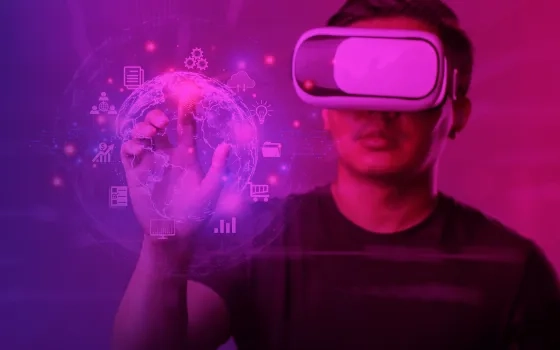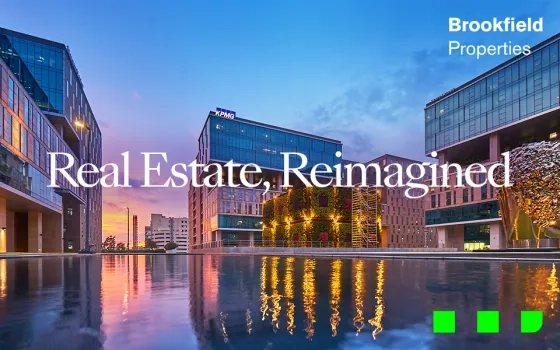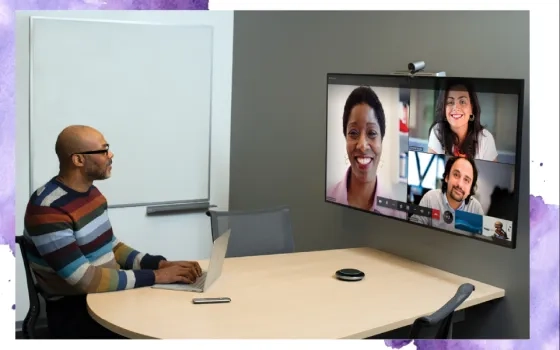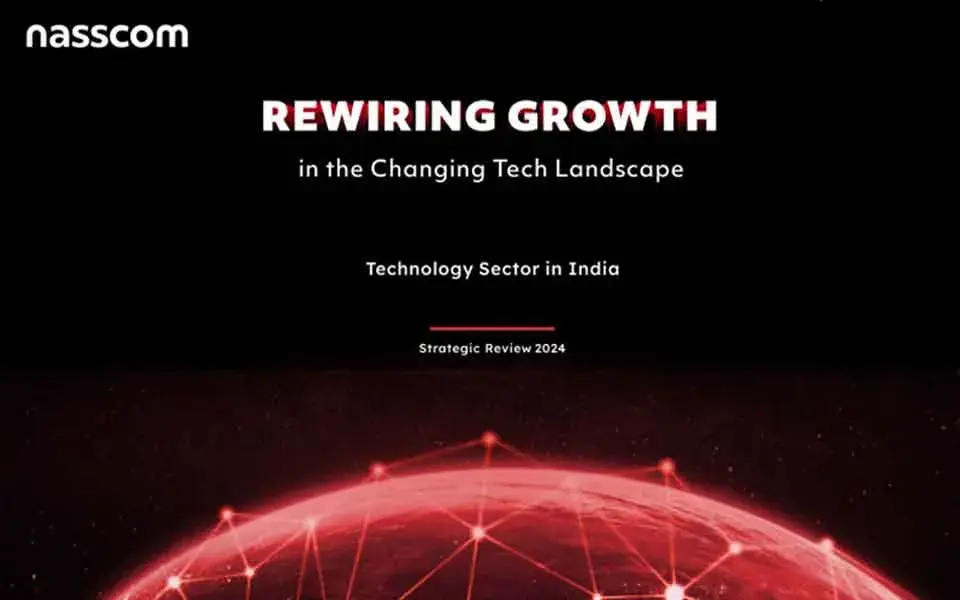An enthralling conversation between Pramod Bhasin, Founder & Chairman at Clix Capital and Former President & CEO at Genpact, and Alan Murray, CEO, Fortune Media at NASSCOM Technology and Leadership Forum (NTLF) held in February 2022, delved into some soul-searching of businesses and underscored the importance of recalibrating the parameters against which we measure the success of businesses. At the end of the day, businesses are entities helmed by people, operated by people, and aiming to serve the needs/wants of people. Hence, the hard blow that the pandemic has landed upon all of us alike, has compelled businesses to go back to the drawing board, rethink the way they want to run the show, revisit their mission and vision, reengineer their products/services to be more sustainable - in compliance with ESG (Environmental, Social and Governance) norms, and rejig their entire enterprise, if need be, to comply with the fundamental idea of 'HUMAN-CENTRICITY'. In fact, over the last decade, the boundaries between business and society have become nebulous, and CEOs have become increasingly cognizant of how their businesses need to deliver outcomes that are not just profitable for the enterprise per se but are aligned to the macrocosm of contributing to ‘greater social good’ as well. The motto of ‘profit with purpose’ is becoming foundational for businesses to conduct operations, driven by several significant changes in the way employees, consumers, leaders, and thus, enterprises are evolving.
The business of business is no longer just business, as businesses are transforming into social enterprises
Enterprises of today and the future need to realign their goals to become engines driving ‘greater good’ as eventually, businesses cannot be in the black, if the society, at large, is not flourishing. Moreover, this change needs to be implemented rapidly. Alan Murray explains in his book, “Tomorrow's Capitalist: My Search for the Soul of Business”, that the least needy see the most improvement and the most needy see the least nowadays; and pragmatically the Covid-crisis has, in practice, only accentuated the vulnerabilities and abyss that existed between different strata of society beforehand. Hence, the human aspect of businesses needs to come to the fore, now more than ever.
Today, fundamental forces in the form of the next-gen of employees and investors/stakeholders are largely driving the change in businesses functioning, as they demand ‘greater social good’ becoming an integral part of the businesses they participate in. In recent times, the propagation of net-zero commitments by industry leaders such as Microsoft and Walmart is a perfect example of how businesses are progressively becoming more socially responsible. Concomitantly, technology and digital transformation are transforming the way businesses function, at breakneck speed. Notably, technologies too, emerging as well as traditional, are being increasingly evaluated through the human lens before being adopted by organizations. ‘Tech4Good’ not only aligns with a company’s Corporate Social Responsibility (CSR) objectives but makes a business case for strategic growth as well.
The multiplier effect of partaking in social good
The pandemic has acted as the inflection point for accelerating the velocity with which organizations are upending the manner in which they conduct business, factoring in not only the financial but also social, cultural, and economic consequences of their actions. The shipping giant, Moller – Maersk, for instance, has invested majorly, in a Danish wind company for setting up wind farms in the North Sea, to create green hydrogen. This, in practice, comes as a spill-over effect of giant companies such as Walmart, who have made net-zero commitments and hence, need to eliminate the carbon footprint of their products in a particular timeframe. In turn, these companies would require all the partners in their supply chain, like Maersk, to contribute to this imperative, by further committing to decarbonization/net-zero initiatives, creating a multiplier effect.
Business with Benevolence
The current crisis in global capitalism is driving businesses to embolden their ‘business for profit and social good’ agenda. With the onset of the pandemic, as governments around the world were grappling with Covid-induced damages, business communities stepped up to the occasion and created opportunities in the face of adversity. Corporate ideologies are fast-changing and on the back of the ongoing talent crunch and ‘The Great Resignation’, CEOs around the globe are realizing that doing business, while envisioning the ‘greater social good’ is a ‘win-win’ situation for all. It not only makes the company stronger by showing the values/beliefs they stand for and having a soul, but by communicating their positioning, it is easier for enterprises to attract and retain the right talent. For example, the FMCG company, Unilever, has become a magnet attracting great talent because of their staunch commitment to climate goals.
Moreover, a comparative analysis of the ‘Fortune-500’ companies in 1970 vis-à-vis today reveals an interesting insight into where does the business value come from. While in the 1970s, 80% of the value came from tangibles (physical things), such as inventories, oil reserves, plant and equipment, etc. which money could buy, today 85% of the value comes from intangibles, such as brand, intellectual property, etc. which is not backed by money but tied to people. Hence, the significance of people in organizations over the last 5 decades was already growing manifold; and Covid further amplified this ‘people-first’ approach in businesses.
Climbing Up the ‘Maslow's Hierarchy of Needs’ Pyramid
Predominantly, for Gen X and preceding generations, the equation of work was WORK=MONEY. They were essentially looking to satiate their ‘Basic (Physiological and Safety) Needs’ in the Needs’ Hierarchy Pyramid, from work. For social good, they would look at other avenues such as church service, civic clubs, etc. Contrastingly, for a majority of the millennials and Gen-Z, WORK=MONEY+SOCIAL PURPOSE, and the latter (social purpose) is equally important, if not more than the former (money). Hence, these generations are climbing up the pyramid to fulfill their ‘Psychological (Love/Belongingness and Esteem) as well as Self-actualization Needs,’ and expect the businesses they work for to be aligned with their needs. The quality of life and purpose of life are becoming increasingly important for future generations.
The talent pool of today is focused on having an impact on society, underpinned by their employer as their foremost connection to society. And in order to achieve this, all key ecosystem players need to play their part. While employers need to change their behaviours/attitudes to attract/retain top talent by realigning business goals with the ‘profit with purpose’ theme focusing on critical areas, such as climate change, net-zero, worker/employee right-skilling, social justice, diversity, equity and inclusion (DE&I), etc., employees need to act as key levers for driving this change in businesses, as do social communities. The trend of consumers willing to pay a premium for purchases supporting social purpose, and nearly 40% of large investment funds having some sort of an ESG screen needs to be promulgated. Governments need to be functioning and deploy interventions and policies aligned with the interests of businesses, workers, employees, and society, at large.
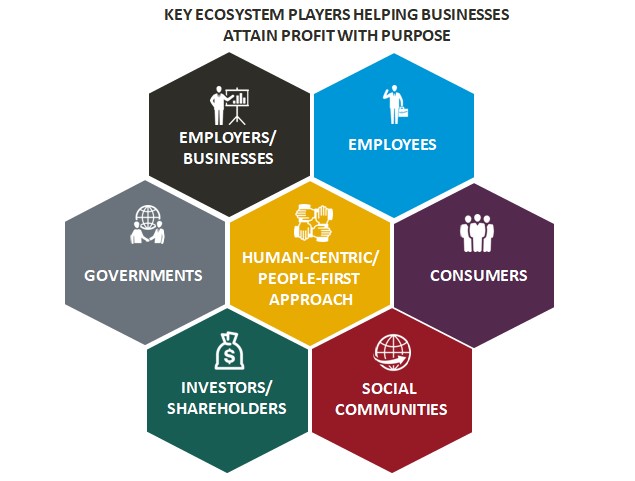
Lengthening the timeline
To sum up, profit and purpose, generally, tend to be conflicting objectives only in the short-term, but in the long run, the interest of shareholders and stakeholders begin to align, and the guardrails between profit and purpose merge. Essentially, businesses are not going to survive if the planet is on fire, so engaging in ‘profit with purpose’ holds the key for enterprises to ‘survive and thrive’ in the future. Also, considering human beings are quintessentially social creatures, with distributed work models and potential/current employees’ demand for flexibility (‘work-from-anywhere’ models), shifting jobs has become easier for employees in the absence of an emotional connect with the enterprise. Thus, the only glue that organizations have to bind their employees to the company is the fact that the enterprise stands for doing greater social good, and not just for making profits. Going forward, businesses need to be much more creative to embed culture, collaboration, and innovation in the organization, and social contribution could act as the catalyst that attracts/retains top talent.
Read the latest NASSCOM “Resilience to Resurgence – Technology Sector in India 2022: Strategic Review” report, please click on the links below –
NASSCOM Community – https://community.nasscom.in/communities/bpm/technology-sector-india-2022-resilience-resurgencestrategic-review
NASSCOM Website - https://nasscom.in/knowledge-center/publications/technology-sector-india-2022-strategic-review






